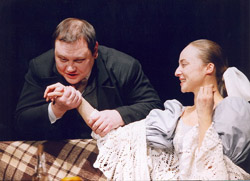
The Russian experimental theatre company Pyotr Fomenko Workshop
will perform the 19th-century Russian farce "Wolves and Sheep," a
play combining elements of melancholy, poetry, impressionism and
humour, tonight and tomorrow at Beijing's Capital Theater.
Largely about cheats and scoundrels, the play by Alexander
Ostrovsky features several protagonists in two opposing camps. The
"wolves," headed by Meropiya and her lawyer, are sly and
manipulative types. Meanwhile, the "sheep," led by Meropiya's poor
nephew and the rich young widow next door, seem innocent and
vulnerable next to bullies such as Meropiya.
Under Fomenko's direction, Ostrovsky's 19th-century farce opens
completely new horizons. There are moments of sheer weirdness that
could only be Russian.
"Under Fomenko's direction, 'Wolves and Sheep' will live up to
theatregoers' high expectations," said Ma Zhenghong, the Chinese
director and 1992 graduate of Fomenko and assistant director of
"Wolves and Sheep" in 1992.
Fully displaying his unique directing style, "Wolves and Sheep"
is one of Fomenko's most acclaimed works, Ma said.
"Fomenko has his own deep tangible ties with the inner world of
Ostrovsky's characters actors, merchants, husband-hunting women,
success-hunting men, unsatisfied middle-class people too
defenceless to be heroes and too weak not to arouse compassion,"
said Ma.
Good examples
"Wolves and Sheep" is the third play to be staged as part of the
Year of Russia in China, which has seen droves of Russian
dramatists entertain Chinese theatregoers.
The first two productions, Maxim Gorky's "The Philistines"
performed by the legendary Moscow Art Theatre and Alexander
Ostrovsky's play "Even A Wise Man Stumbles" by Moscow's State
Academy Maly Drama Theatre, have already left deep impressions upon
the audiences.
Chinese theatre professionals, who are looking forward to
tonight's show, said they have already learnt a lot from their
Russian counterparts.
Meng Jinghui, China's leading avant-garde director, said "The
Philistines" was the best play he had seen so far this year, adding
that he appreciated all of the actors' performances.
Popular Chinese actor Pu Cunxin added: "I watched both Russian
plays. They were unexpectedly wonderful. Every performer deserves
our admiration."
Pu noted that modern Chinese drama drew a lot of inspiration
from Russian theatre, with Stanislavsky and Nemirovich-Danchenko
being particular role models.
"Our fathers' generation staged many Russian plays," said Pu, a
leading actor and artistic director of Beijing People's Art
Theatre. His father Su Min was once a renowned actor and director
of the Beijing People's Art Theatre.
"However, we have neglected Russian plays for a while," Pu
said.
In 1991, when a Russian director came to Beijing People's Art
Theatre to direct "Seagull," the performers including Pu felt it
was difficult to communicate with him.
"It was not because of the language," he recalled. "It was
because we knew little about the background of the play, or their
approach towards performing it."
"We have lagged behind Russian and global drama trends for quite
some time. We, as Chinese theatre professionals, need to open our
minds, see more of the latest productions and become aware of
global drama trends," Pu added.
Tong Daoming, a veteran drama critic specializing in Russian
works, agreed with Pu. He said that "Wolves and Sheep" is well
worth seeing.
Renowned director
Born in 1932, Fomenko is one of Russia's most renowned theatre
directors and teachers. Although he follows in the rich tradition
in the Russian theatre, Fomenko has established his own unique
style.
"What distinguishes Fomenko is his passionate desire to
communicate exclusively on levels of dignity, intelligence, beauty
and honesty. Fomenko does not shun hard truths," wrote The Moscow
Times.
Fomenko graduated from the Philological Faculty of Moscow
Pedagogical Institute in 1955 and in 1961 from the Directors'
Faculty of GITIS (Russian Academy of Theatre Art), which has helped
shape contemporary Russian theatre.
He worked at different Moscow theatres in the 1960s and 1970s.
From 1977 to 1981, he was the chief artistic director of Leningrad
Comedy Theatre. Fomenko returned to Moscow in 1981. He has taught
at GITIS, where he became a professor in 1992.
In 1993, he formed the Pyotr Fomenko Workshop as an experimental
theatre to be used by various directors to realize their respective
projects and ideas, and with a view to revealing actors' potential,
experimenting with complicated spatial arrangements and trying out
different production and acting styles. Another important goal was
to continue with and improve young actors' professional
training.
Their productions over the last 13 years include: Ostrovsky's
"Wolves and Sheep," Vakhtin's "An Absolutely Happy Village,"
Tolstoy's "Family Happiness" and "War and Peace," Giraudoux's "The
Madwoman of Chaillot," Pushkin's "Egyptian Nights" and Chekhov's
"Three Sisters."
(China Daily July 4, 2006)
|

